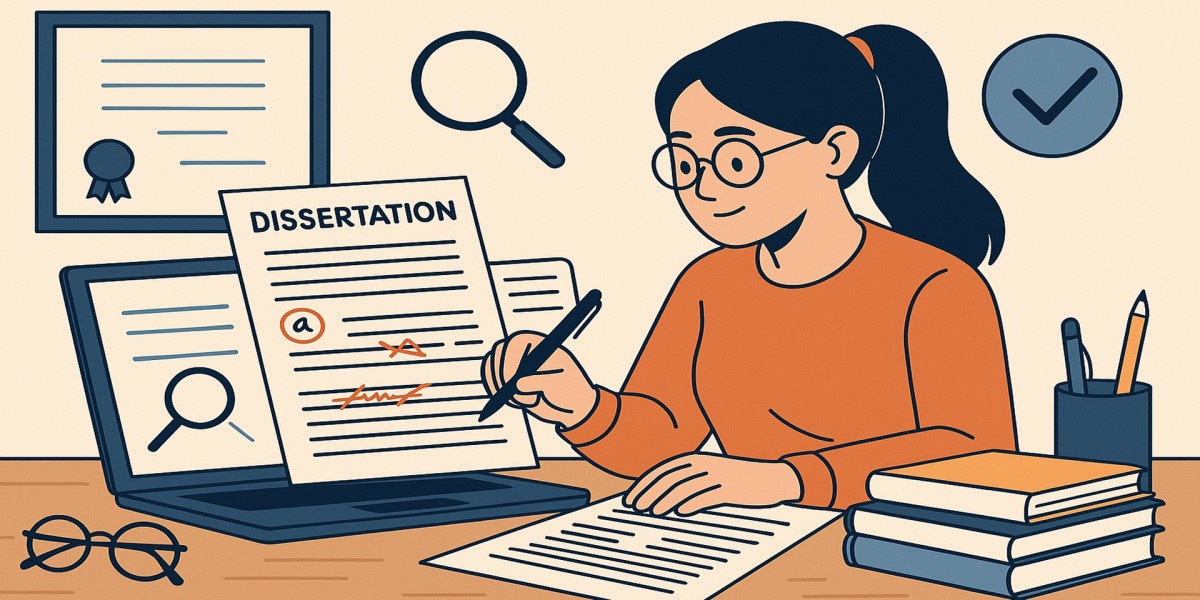Get Expert Help with Dissertation Editing and Proofreading – Ensure Academic Success
You’ve reached the final stage of your dissertation. The finish line is in sight. You’ve spent months (or maybe even years) researching, writing, and rewriting. So here’s the real talk: this is not the time to wing it on the final polish.
Minor errors typos, inconsistent formatting, clumsy phrasing might not seem like a big deal after everything you’ve done. But they can (and do) lead to delays, revision requests, or even rejection. And trust me, you don’t want to lose marks for something that could’ve been fixed with a fresh pair of professional eyes.
That’s why editing and proofreading services exist and why they’re absolutely worth considering before you hit submit.
What Is a Dissertation Editing and Proofreading Service?
Okay, let’s break it down because editing and proofreading are not the same thing, but they do work best together.
Editing focuses on structure, clarity, tone, and flow. It’s about making sure your arguments are solid, your language is sharp, and your writing actually makes sense (especially after multiple drafts).
Proofreading, on the other hand, is the final check. Grammar, spelling, punctuation, formatting all the tiny stuff that sneaks through even when you think you’ve been careful.
Think of editing as the structural renovation and proofreading as the paint and finish. One fixes what’s inside, the other makes it look clean and ready for presentation. Most dissertation-ready documents need both.
Key Features of Professional Editing and Proofreading
3.1 Dissertation Editing Includes:
Content clarity and logical flow
Your ideas should build up clearly. Editors make sure your arguments are structured and easy to follow.Sentence structure and academic tone
No casual phrasing, no choppy paragraphs. Just strong, academic writing that holds up.Consistency in headings, language, and voice
If Chapter 1 uses “methodology” and Chapter 3 calls it “research process,” you’ll get flagged. Editors fix that.Alignment with university or journal guidelines
Every school and journal has its own rules. Editors ensure your work checks every box.
3.2 Dissertation Proofreading Covers:
Grammar, punctuation, and spelling checks
From basic typos to sentence-level polish, proofreaders catch what you (and spellcheck) miss.Typographical error correction
Weird spacing, double periods, accidental italics? Gone.Citation and referencing style consistency
APA, MLA, Chicago, Harvard whatever your university wants, it gets done right.Formatting of tables, figures, footnotes, etc.
You get clean visuals, aligned margins, consistent headings basically, presentation perfection.
Who Needs These Services and Why?
Here’s the thing: everyone can benefit from editing and proofreading. But some people need it more than others.
Postgraduate and PhD students
If you're prepping for final submission or defense, you need your work to be as airtight as your research.Non-native English speakers
Your ideas are solid but your sentence structure might need a little help. That's normal.Researchers submitting to peer-reviewed journals
Journals don’t just look for good research they expect flawless presentation.
Why it matters:
Makes your work easier to read and understand
Boosts your credibility as a researcher
Reduces revision cycles
Increases your chances of approval or publication
Benefits of Hiring a Professional Service
Let’s be real by the time you’re done writing your dissertation, your brain is fried. You’re too close to the content to spot the issues, and your focus is probably on finishing, not perfecting.
Here’s what you gain by letting the pros step in:
Saves you hours (and mental energy)
Stop re-reading the same paragraph 50 times. Let someone else polish it for you.Improves tone and flow across chapters
Especially helpful if you've been writing in phases over several months.Increases chances of quick approval
Because errors = corrections = delays. Proofreading = clean copy = progress.Fulfills formatting and submission requirements
You won't lose marks for margin size, font type, or inconsistent citations.Gives you peace of mind
You’ll feel more confident submitting something that’s been professionally reviewed.
When Should You Use These Services?
After you’ve finished your final draft
Don’t proofread while you’re still writing you’ll end up redoing the work later.Before submission to your supervisor or committee
A clean, professional document makes a way better first impression.When revising after feedback
You’ve made the content changes. Now make sure they’re error-free and well-integrated.
How to Choose the Right Service Provider
Not all editing and proofreading services are created equal. Here’s what to look for if you actually want value for your money:
Subject-matter experts
The best editors understand your field, not just your grammar.Clear pricing and turnaround times
No shady "starting from" rates. You should know what you’re getting and when.Data confidentiality
Your research should never be shared, saved, or seen by anyone outside the editing process.Positive reviews and satisfaction guarantees
Look for testimonials from students like you, and don’t be afraid to ask for a sample.
Picking the right service means fewer worries, better results, and no surprises before submission day.
Common Mistakes Editors and Proofreaders Catch (That You Probably Won’t)
Inconsistent reference formatting
You may not notice that you switched between APA 6th and 7th mid-way. They will.Poor paragraph transitions
Flow is everything. Good editing smooths it out.Misuse of academic vocabulary
Henceforth " and"thereby " don’t belong in every sentence.Typographical and layout issues
Like headings that don’t align, page numbers in the wrong font, or extra spaces between paragraphs.
Final Thoughts
You’ve put in the work. The research, the writing, the late nights, the edits it’s all built up to this. But a strong dissertation isn’t just about what you say. It’s about how you say it.
Professional editing and proofreading make sure your content is presented at its best, clear, clean, and ready to submit. Whether you’re submitting to your university or a journal, don’t let basic errors or formatting slip-ups be the reason you get held back.







